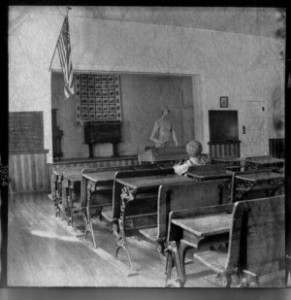School Will Change, With or Without Following Rules
“School Will Change, With or Without Following Rules” by Editor Tina Barseghian was originally published on MindShift.
—

Public education is, by its very nature, tangled with policy, dependent on rules and regulations set by federal, state, and district mandates. What most students do in school at any given moment has been prescribed by legislation passed years before they — or their parents — entered kindergarten.
But things are changing — and quickly. With access to the Internet and learning devices in the hands of kids and teachers, and with technology ever-evolving and becoming ever more affordable and ubiquitous, the school experience will have to change.
“We can create much more dynamic results that will change with time if we’re flexible than if we take the top-down approach from the smartest people in the world.”
This was the big message echoed yesterday by folks like the Department of Education’s Director of Technology Karen Cator, Innosight Institute’s Michael Horn, former Governor Bob Wise who’s now president of the Alliance of Excellent Education, and former Governor Jeb Bush, of the Foundation for Excellent Education. They were gathered to talk to journalists from around the country about how and where these changes are happening.
What’s unusual about this moment in time is the collision between a number of forces at work: a strong-voiced, growing grassroots movement of teachers who object to having their hands tied by an obsolete testing system, a hungry tech industry eager to jump into the education sector, a receptive Secretary of Education who wants to provide incentives for innovations, and successful examples of school models that are showing signs of high student achievement AND engagement.
But these changes will happen whether or not government on any level or the entrenched public education system mandates them.
“My recommendation is not to try to prescribe anything,” Bush said in reply to my question about schools’ trepidation in using fast-changing technology and the disruption of bring-your-own-devices models. “I think we should not do what public education has done for over 100 years — to prescribe how it needs to be. We need to make sure that we don’t pick winners and losers. We need to assume that technology will change, assume that there will be adaptive software, assume that there will be demand and there will be supply fulfilled.”
He continued: “I think we have a tendency to try to take our core beliefs and prescribe rules around how it will work. But we can create much more dynamic results that will change with time if we’re flexible than if we take the top-down approach from the smartest people in the world.”
Wise added another important point: “Legislators cannot legislate technology,” he said. “By the time you get to a consensus, that technology has leapfrogged over you. What you have to do is to provide flexibility that allows systems to move. It’s recognizing that technology is like water, it finds its levels, it moves.”
By far more important than waiting for rules to be created is to jump in. “The alternative is not to, and that’s a fatal mistake,” Wise said.
Mistakes will be made, no question. As a new testing system is created, how we measure learning will change, but all the steps to get to that ideal will go through lots of iterations, too. Whether we’ll go to competency-based rather than age-based assessments (at the moment it’s comparing apples to oranges), whether the textbook industry will crumble in the wake of free, open-source content or if it will adapt, how teachers will respond to new blended-learning models, whether the majority of online schools will prove to provide high-quality education — none of these issues will be resolved cleanly.
But from what I’m seeing, the momentum has been set in motion.






Joel Heinrichs
Great post Tina!
I like how Bob said, "Legislators cannot legislate technology. By the time you get to a consensus, that technology has leapfrogged over you."
Very true!
I can't help but think the wave of tehnology will inevitably sweep away the old educational paradigm. I talk about this in my post here: http://mbcurl.me/265